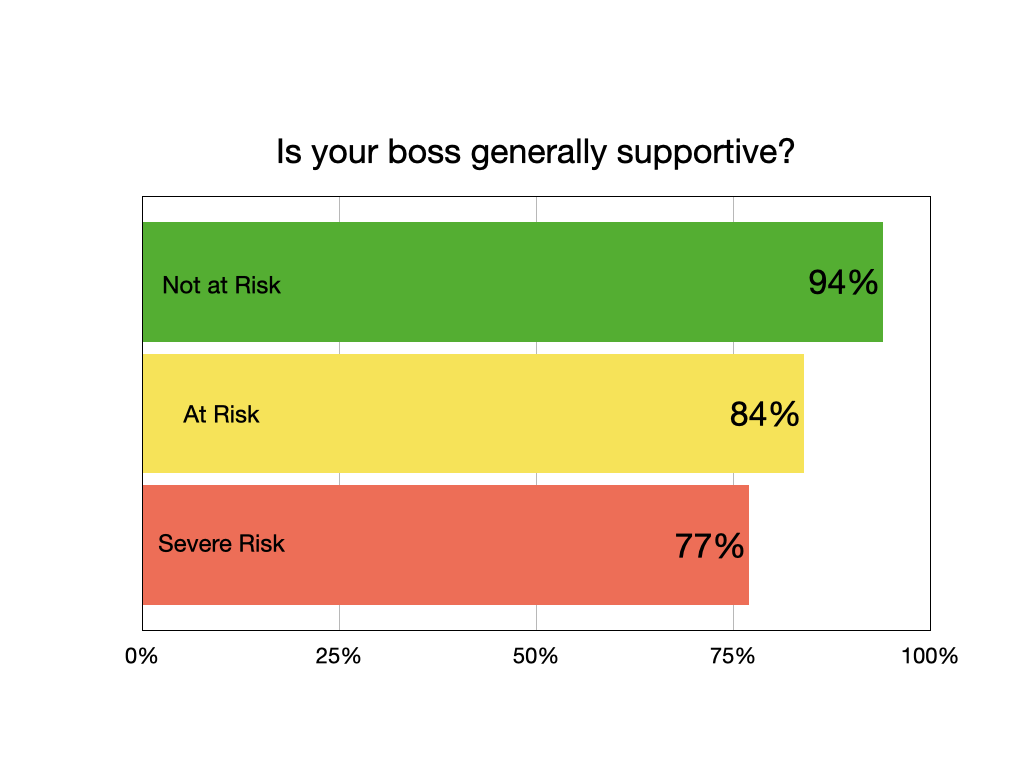This blog is a participant in the Amazon Services LLC Associates Program, an affiliate advertising program designed to provide a means to earn fees by linking to Amazon.com and affiliated sites.
Is burnout gripping your contact center?
A worldwide survey of contact center agents revealed 59 percent are at risk of burnout, including 28 percent who face a severe burnout risk.
Burnout is defined by the American Psychological Association as "physical, emotional, or mental exhaustion accompanied by decreased motivation, lowered performance, and negative attitudes towards oneself and others."
That spells trouble for contact centers. Agent burnout can lead to:
Poor customer service
Chronic absenteeism
Turnover
The survey investigated what factors made agents more at risk of burning out, and what factors made them more resilient. Agents with the lowest risk of burnout tend to be:
Empowered to serve customers
Compensated fairly
Supported by their boss
The survey examined 15 factors and found a total of 11 were tied to lower burnout risk.
Burnout study overview
A total of 951 contact center agents participated between January and February 2023. The responses were anonymous. Agents from multiple countries and companies participated.
Participants were first asked to complete a burnout self-assessment provided by MindTools. The assessment generated a burnout risk score on a scale of 15-75:
15-32 = Little to no risk of burnout
33-49 = At risk of burnout
50-75 = Severe risk of burnout
Next, participants were asked 15 questions about their work environment. The topics ranged from the training they received to whether they had a good friend at work.
Of the 15 factors, 11 were correlated with a lower burnout risk.
This was determined by a 10 or more percentage point gap between agents with no burnout risk compared to agents with a severe risk of burnout.
There was some good news.
While 59 percent of agents surveyed were in the at risk or severe risk category, there is some improvement from a similar report from 2016. That study found 74 percent of contact center agents were at risk of burnout.
This post highlights the top three factors that make agents more resilient to burnout. You can download the complete study here.
Top three ways to prevent agent burnout
Having a customer-focused organization is table stakes.
A whopping 94 percent of agents who were not at risk of burnout felt their organization was customer-focused, compared to just 80 percent of severe risk agents.
But becoming customer-focused is a long journey. In my experience, it takes an average of two years. You can get there by following The Service Culture Handbook, and I think you should, but here are three things you can do right now.
1. Empower your agents
Agents at low-risk of burnout are much more likely to feel empowered than agents facing a severe burnout risk.
Empowerment is a process of enabling agents to do good work. It involves giving agents:
Adequate resources to help customers
Best practice procedures to be more consistent
Authority to deviate from normal procedures when it makes sense
I've created a collection of employee empowerment resources to help you empower your team.
2. Pay your agents well
You've probably heard a disgruntled employee say, "They don't pay me enough to deal with this." Okay, you've probably said it at least once or twice yourself.
It turns out that adequate pay helps make agents more resilient.
This isn't too surprising.
Daniel Pink's groundbreaking book on motivation, Drive, revealed employees are generally motivated by three things:
Autonomy (see empowerment, above)
Mastery
Purpose (i.e. working for a customer-focused organization)
There’s a huge caveat to all this research. You have to pay people enough that they don't worry about pay. For most companies, this means above the mid-line.
Zeyenp Ton's excellent book, The Good Jobs Strategy, profiles customer-focused companies like Trader Joe's and Costco. These companies pay their employees well above market, despite having very low prices.
How can this possibly work? Three simple reasons:
Access to better talent. The best employees can earn more.
Improved results. Better employees, by definition, can do more.
Decreased turnover. People are less likely to leave a good job when they're well-paid.
Making the case for giving employees is all above math. Don't worry, I don't enjoy math either, so I wrote this guide to help you make your case.
3. Support your team
Agents who felt they had a supportive boss are much less likely to be at risk of burnout.
A supportive boss makes employees feel like they can succeed. They bring out the best in people, and help their team reach new levels of mastery in their role.
Supportive actions include coaching, encouragement, and even accountability.
Wait, accountability?!
Yep. Accountability isn’t punishment. Holding someone accountable really means giving them responsibility. (Employees like that.)
I won't lie to you. Being a supportive leader is tough. I mean, who’s got your back? Managers often feel stuck between demanding executives and (seemingly) needy employees.
It doesn’t have to be that way, so I've put together a collection of resources to help you get started.
Get the report
Discover 11 factors that make agents more resilient to burnout.
Conclusion
Employees like working for customer-focused companies with great products, especially if they are empowered, paid well, and have a good boss.
You knew that already. Now you have some real data to back it up.
One surprise was about remote agents. People who primarily work from home aren't any more or less resilient to burnout than agents who work primarily onsite.
Strangely, remote agents were more likely to get regular feedback from their boss.
You can download the full report to read even more insights. And if you suspect burnout is a challenge for your contact center, drop me a line and let's talk.










